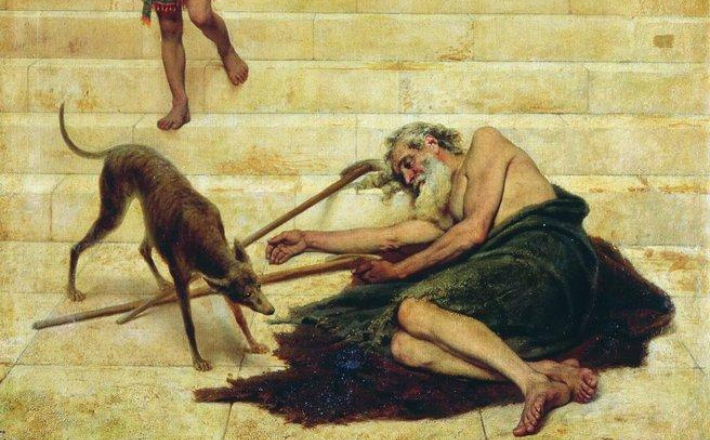Commentary on Jeremiah 32:1-3a, 6-15
One version of the Bible titles this text “Jeremiah Buys a Field,” which might seem unremarkable, especially compared to other happenings in Jeremiah. However, with the inspiration of the word of the Lord and given the surrounding circumstances, an ordinary transaction becomes extraordinary.
Jeremiah is clear that this purchase is not something random he dreamed up but comes about and has profound meaning due to the power and influence of the word of the Lord. Within this pericope, Jeremiah refers to the word of the Lord three times (verses 1, 6, 8) and invokes the prophetic messenger formula “thus says the Lord” twice (verses 14, 15). His purchase and its meaning are nothing less than the workings of God.
Jeremiah 32 begins with significant historical context. Zedekiah is king in Judah, and Nebuchadnezzar in Babylon. The Babylonian army is besieging Jerusalem, where Zedekiah has imprisoned Jeremiah. Verses omitted from the reading remind us that Jeremiah had prophesied that Jerusalem would be given over to Babylon, and with it, King Zedekiah taken captive. Jeremiah had essentially told Zedekiah that resistance would be futile.
After this reminder of Jeremiah’s prophecy that is now unfolding, the word of the Lord tells him that Hanamel, son of his uncle Shallum, will visit him with a proposition for Jeremiah to buy a field. This is not a run-of-the-mill land deal. The land itself is under siege by a powerful invader, and the suggested buyer is in jail! But Hanamel indeed shows up and makes Jeremiah the offer.
Even Jeremiah may have initially questioned the sensibility of purchasing the field. The word of the Lord and Hanamel say Jeremiah has a right to redemption of the land, referring to Leviticus 25:23–28 in which a next-of-kin could acquire land to prevent it from being lost by the family. However, it is unclear how such a purchase by a next-of-kin in jail could save the land from loss to an invading army. When Hanamel’s visit and offer happen, however, just as God had revealed to Jeremiah, the prophet realizes that his experience of the word of the Lord was legitimate (verse 8b), so he proceeds with the purchase, the details of which are meticulously recorded in verses 9–12.
Additionally, the field is in Anathoth, where Jeremiah was born and delivered some of his earliest prophecies. In response to those prophecies, however, Jeremiah faced ridicule and even threats against his life. God had warned Jeremiah of the plot against his life and declared that, as a result, the city would be punished by the sword and famine (see Jeremiah 11).
So this text is more complicated than simply “Jeremiah buys a field.” Instead, a family member offers for sale to Jeremiah, who is in jail in Jerusalem, a field in a city Jeremiah had to flee due to persecution and threats, in a region under siege by an invading army. That would seem an offer easy to refuse! And yet, Jeremiah accepts—listing out the details of the purchase as if to emphasize the point that, against all logic, this is a legit, by-the-book land-sale transaction. Furthermore, in verses 13–14, Jeremiah charges his scribe, Baruch, to seal the deeds in a clay jar “in order that they may endure many days” (my translation). Why on earth would Jeremiah bother, or even want, to ensure the preservation of the documents for such a ludicrous purchase?
The answer comes in verse 15: The Lord God declares that houses, fields, and vineyards will someday again be bought in the land. This is more than just a real-estate transaction, and Jeremiah’s role is anything but that of a crafty investor. The purchase of this field is a prophetic act—a prophecy delivered through something Jeremiah does rather than says.1
In all likelihood, Jeremiah will never see the field he has purchased in Anathoth, let alone be able to do anything with it. Jeremiah’s utilization of the field is not the point, however. Instead, his peculiar purchase witnesses to the field having a future. Despite the dire circumstances currently faced by Jeremiah and all of Judah and Benjamin, hope remains for the future—a hope for the future that is not a foolish pipe-dream of humans but a promise from God. This promise does not negate God’s judgment on the people for their gross misdeeds—the Babylonian siege is already underway. Nevertheless, neither the Babylonians nor judgment will be the end of the story of God’s people.
Although the pericope ends with verse 15, there follows the opportunity to immerse the congregation more fully in this prophetic book, as the rest of the chapter builds upon the appointed verses. The next section (verses 16–25) may be referred to as “Jeremiah’s prayer for understanding.” Jeremiah still seems to be scratching his head over the prophetic act in which he has just engaged. Was it really something set in motion by the word of the Lord, or a desperate gasp of a man in jail?
The prophet goes through a highlight reel of God’s past saving acts for God’s people (through verse 23a), but then turns to the people’s disobedience and resulting punishment. In verse 24, Jeremiah says the siege ramps are against the city, as if to say, “See, God, just like you said—there they are!” Yet, says Jeremiah in the next verse, you told me to go buy a field, even though the city is under siege. Although Jeremiah had declared that nothing is too hard for God (verse 17), he may be thinking that under these circumstances, hope for the future just might be.
The rest of the chapter conveys God’s response. In verse 27, God reminds Jeremiah of his earlier statement and asks rhetorically, “Is anything too hard for me?” In the remaining verses, God makes it clear that no, not even this is too hard for the Lord, the God of all flesh. Because of the people’s transgressions, God’s judgment will run its course. However, redemption will follow. God will gather what was scattered and establish an everlasting covenant—even pledging the divine heart and soul as an indication of God’s faithfulness (verse 41). God resoundingly reassures Jeremiah that the purchase of the field in Anathoth was not foolish, but rather a profound prophetic act pointing to God’s ultimate desire to redeem God’s people. “For I will restore their fortunes, says the Lord” (verse 44).
Notes
- Other prophetic acts of Jeremiah include burying and later digging up a linen loincloth (13:1–11), purchasing and smashing a clay jar (19:1–15), and making and wearing a yoke (27:1–8).


September 28, 2025